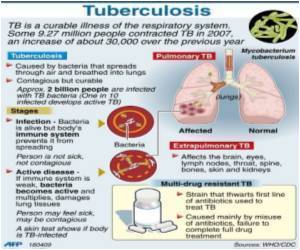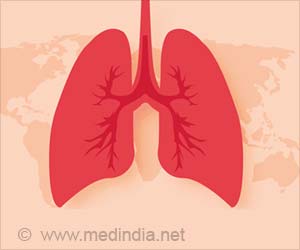
TB is a pandemic that killed 1.7 million people in 2009, excluding those who died when affected by AIDS, having TB as final cause of death. The disease is caused by infection with the bacterium Mycobacterium tuberculosis and destroys patients' lung tissue. The infection can then spread through the air as patients cough up bacteria which can be inhaled by others.
Drug-resistant and multidrug-resistant TB (MDR-TB)* are forms of TB that have become resistant to anti-TB drugs, making the condition more difficult to treat. Major weaknesses in the health care systems are behind the creation of resistance to anti-TB drugs.
These guidelines are the result of a systematic review of the best evidence available in the scientific literature analysed by top experts in the field convened by WHO.
While there have been no radical changes in the recommendations from the previous guidelines published in 2008, the process of developing the document has highlighted important gaps in TB research. The low quality evidence on treatment composition, duration and management of the condition suggests that systems could be further optimised in future. Hence, the authors are calling for more research to help improve our understanding of disease management, including controlled trials to determine the best length and combination of current drugs which increase the chances of successful outcome for MDR-TB patients.
The guidelines cover key aspects of the management of TB including diagnosis, treatment, monitoring and cost-effectiveness of different models of care. They aim to guide countries, in particular those in lower income settings, to make early diagnosis and strengthen patient care.
Advertisement
- A wider use of rapid drug susceptibility testing for isoniazid and rifampicin or rifampicin alone upon patient diagnosis with TB and before treatment initiation
- The best care system is one focused on ambulatory models of care, in which patients are treated outside of hospital, rather than systems which focus on the hospitalisation of patients.
The overall cost-effectiveness of care for a drug-resistant TB patient can be improved using an ambulatory model of care. In addition, ambulatory care is expected to bear other benefits to the patient such as by reducing travel, social isolation and risk of reinfection.
- Patients with MDR-TB should receive an intensive phase of treatment lasting for at least 8 months' duration. Patients who have not been treated with second-line drugs for tuberculosis in the past should undergo 20 months of treatment.
The recommended minimum duration of treatment with injectable drugs has been extended by 2 months from the previous guidelines as evidence shows that this increases the likelihood of treatment success. Most patients can expect to receive treatment for this length of time but the duration may be modified depending on clinical and bacteriological response.
Head of the Respiratory Infections Assembly at the European Respiratory Society, Professor GB Migliori, said: "The new evidence-based WHO guidelines are a milestone clinicians and public health specialists were waiting anxiously to guide their interventions. They resulted from an unprecedented collaboration among the top global experts and national programme managers who accepted to share data to inform the guidelines."
Source-Eurekalert











